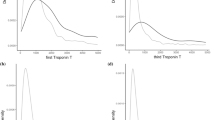Abstract
Cardiac troponin I (cTnI) is a regulatory protein with a high sensitivity and specificity for cardiac injury. Preoperative and postoperative elevations of cTnI are usually considered predictors of the mortality and morbidity. However, little is known about the relationship between the cTnI and postoperative course after the congenital heart disease (CHD) operation. Sixty-five consecutive patients who underwent cardiac surgery for CHD at our institution between March 2016 and January 2017 were included. The cTnI was measured after the operation. Also, the association between the cTnI and duration of the catecholamine use, ICU stay, aortic cross clamp time, and other clinical parameters were assessed. The cTnI level on postoperative day 1 was positively correlated with the duration of the catecholamine use (p < 0.001) and ICU stay (p < 0.001). Also, a higher cTnI level was associated with a lower urine volume and higher lactate level 24 h after the ICU admission. In the multivariable regression analysis, the cTnI was a significant independent predictor of the catecholamine use (p = 0.002) and ICU stay (p = 0.003). The cTnI level on postoperative day 1 was a predictor of the duration of the catecholamine use and ICU stay.



Similar content being viewed by others
References
Adams JE 3rd, Bodor GS, Dávila-Román VG, Delmez JA, Apple FS, Ladenson JH, Jaffe AS (1993) Cardiac troponin I: a marker with high specificity for cardiac injury. Circulation 88:101–106
Adams JE 3rd, Sicard GA, Allen BT, Bridwell KH, Lenke LG, Dávila-Román VG, Bodor GS, Ladenson JH, Allans S (1994) Diagnosis of perioperative myocardial infarction with measurement of cardiac troponin I. N Engl J Med 330:670–674
Ausoni S, De Nardi C, Moretti P, Gorza L, Schiaffio S (1991) Developmental expression of rat cardiac troponin I mRNA. Development 112:1041–1051
Ferguson JL, Beckett GJ, Stoddart M, Walker SW, Fox KAA (2002) Myocardial infarction redefined: the new ACC/ESC definition, based on cardiac troponin, increases the apparent incidence of infarction. Heart 88:343–347
Bonnefoy E, Godon P, Kirkorian G, Fatemi M, Chevalier P, Touboul P (2000) Serum cardiac troponin I and ST-segment elevation in patients with acute pericarditis. Eur Heart J 21:832–836
Smith SC, Ladenson JH, Mason JW, Jaffe AS (1997) Elevations of cardiac troponin I associated with myocarditis. Experimental and clinical correlates. Circulation 95:163–168
Lauer B, Niederau C, Kuhl U, Schannwell M, Pauschinger M, Strauer BE, Schultheiss HP (1997) Cardiac troponin T in patients with clinically suspected myocarditis. J Am Coll Cardiol 30:1354–1359
Horwich TB, Patel J, MacLellan WR, Fonarow GC (2003) Cardiac troponin I is associated with impaired hemodynamics, progressive left ventricular dysfunction, and increased mortality rates in advanced heart failure. Circulation 108:833–838
Blich M, Sebbag A, Attias J, Aronson D, Markiewicz W (2008) Cardiac troponin elevation in hospitalized patients without acute coronary syndromes. Am J Cardiol 101:1384–1388
Immer FF, Stocker F, Seller AM, Pfammatter JP, Bachmann D, Printzen G, Carrel T (1999) Troponin-I for prediction of early postoperative course after pediatric cardiac surgery. J Am Coll Cardiol 33:1719–1723
Bottio T, Vida V, Padalino M, Gerosa G, Stellin G (2006) Early and long-term prognostic value of troponin-I after cardiac surgery in newborns and children. Euro J Cardiothorac Surg 30:250–255
Sugimoto M, Ota K, Kajihama A, Nakau K, Manabe H, Kajino H (2011) Volume overload and pressure overload due to left-to-right shunt-induced myocardial injury. Circ J 75:2213–2219
Bojan M, Peperstraete H, Lilot M, Vicca S, Pouard P, Vouhé P (2012) Early elevation of cardiac troponin I is predictive of short-term outcome in neonates and infants with coronary anomalies or reduced ventricular mass undergoing cardiac surgery. J Thorac Cardiovasc Surg 144:1436–1444
Saraiya NR, Sun LS, Jonassen AE, Pesce MA, Queagebeur JM (2005) Serum cardiac troponin-I elevation in neonatal cardiac surgery is lesion-dependent. J Cardiothorac Vasc Anesth 19:620–625
Croal BL, Hillis GS, Gibson PH, Fazal MT, El-Shafei H, Gibson G, Jeffrey RR, Buchan KG, West D, Cuthbertson BH (2006) Relationship between postoperative cardiac troponin I levels and outcome of cardiac surgery. Circulation 114:1468–1475
Mann DL (1999) Mechanisms and models on heart failure. Circulation 100:999–1008
Parodi O, De Maria R, Oltrona L, Testa R, Sambuceti G, Roghi A, Merli M, Belingheri L, Accinni R, Spinelli F (1993) Myocardial blood flow distribution in patients with ischemic heart disease or dilated cardiomyopathy undergoing heart transplantation. Circulation 88:509–522
Rauchhaus M, Koloczek V, Volk HD, Kemp M, Niebauer J, Francis DP, Coats AJS, Anker SD (2000) Inflammatory cytokines and the possible immunological role for lipoproteins in chronic heart failure. Int J Cardiol 76:125–133
Carmona F, Hanso PH, Vicente W, Castro M, Carlotti A (2008) Risk stratification in neonates and infants submitted to cardiac surgery with cardiopulmonary bypass: a multicenter approach combining inflammatory mediators, N-terminal pro-B-type natriuretic peptide and troponin I. Cytokine 42:317–324
Acknowledgements
The authors thank their colleagues at Saitama Medical University who performed the cardiac surgery.
Author information
Authors and Affiliations
Corresponding author
Ethics declarations
Conflict of interest
The authors declare that they have no conflict of interest.
Additional information
Publisher's Note
Springer Nature remains neutral with regard to jurisdictional claims in published maps and institutional affiliations.
Rights and permissions
About this article
Cite this article
Kojima, T., Toda, K., Oyanagi, T. et al. Early assessment of cardiac troponin I predicts the postoperative cardiac status and clinical course after congenital heart disease surgery. Heart Vessels 35, 417–421 (2020). https://doi.org/10.1007/s00380-019-01497-9
Received:
Accepted:
Published:
Issue Date:
DOI: https://doi.org/10.1007/s00380-019-01497-9




